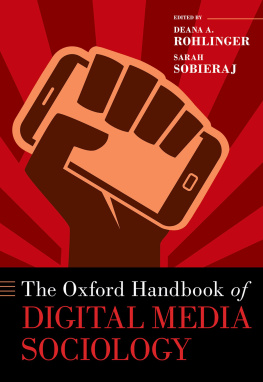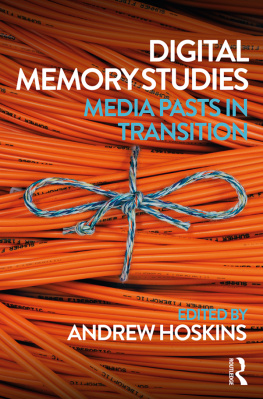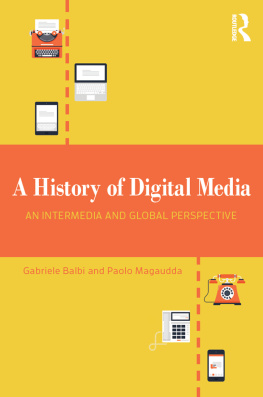For Clifford Christians, the teacher, mentor, and friend who got it started.
Contributors
Mark Amerika is a digital media artist whose work has been exhibited internationally at venues such as the Whitney Biennial of American Art, the Denver Art Museum, and the Institute of Contemporary Arts in London, the Walker Art Center, the American Museum of the Moving Image, and ACA Media Arts Plaza in Tokyo, Japan. He is the author of many books, including his collection of artist writings entitled META/DATA: A Digital Poetics (MIT Press, 2007) and remixthebook (University of Minnesota Press, 2011). He is a Professor of Art and Art History at the University of Colorado at Boulder. His Internet art may be found at http://markamerika.com.
Vanessa Au is a Ph.D. candidate in the Department of Communication at the University of Washington, an organizing member of the Asian American Studies Research Collective at the Simpson Center for the Humanities, and a Senior Analyst at the Spring Creek Group, a social media brand analytics, strategy, and marketing services agency located in Seattle, WA. She has published articles in Flow, and presented research at numerous conferences including annual meetings of the National Communication Association, Association of Asian American Studies, Critical Ethnic Studies Association, and Popular Culture Association.
Paul Booth is an Assistant Professor of Media and Cinema Studies, and Communication Technology, at DePaul University in Chicago. He is the author of Digital Fandom: New Media Studies (2010), and has published articles in Television and New Media, The Journal of New Media and Culture, Narrative Inquiry, Critical Studies in Media Communication, and The Journal of Narrative Theory. His work investigates the intersection of traditional and interactive media. His research interests also include participatory audiences, fans, popular culture, science fiction, television, narrative, games, technology, and mediation. He is currently writing about temporality and complex television.
Jack Z. Bratich is an Associate Professor of Journalism and Media Studies at Rutgers University. He authored Conspiracy Panics: Political Rationality and Popular Culture (2008) and co-edited, along with Jeremy Packer and Cameron McCarthy, Foucault, Cultural Studies, and Governmentality (2003). His work applies autonomist social theory to such topics as reality television, social media, and the cultural politics of secrecy. He is currently writing a book entitled Programming Reality (Lexington, forthcoming), which examines reality programs (on and off television) as experiments in affective convergence.
Richard L. Edwards is an Assistant Professor of Media Arts and Sciences in the New Media Program at Indiana Universitys School of Informatics, Indianapolis. He was a postdoctoral fellow at the University of Southern Californias Annenberg Center for Communications Institute for Multimedia Literacy from 2001 to 2004. His essays on political uses of new media, remix culture, and video practices have appeared in Film International , Spectator , and Flow . His most recent papers on remix culture and political mashups have been presented at the Society for Cinema and Media Studies, New Media Consortium, and as part of invited talks.
Hctor Fernndez LHoeste is Associate Professor at Georgia State University in Atlanta, where he teaches Latin American cultural studies. He is also Director of the Center for Latin American and Latino/a Studies. His publications include Narrativas de representacin urbana (Peter Lang, 1998); Rockin Las Americas (University of Pittsburgh, 2004), the first scholarly anthology of rock in Spanish and Portuguese in the Americas; and Redrawing The Nation (Palgrave Macmillan, 2009), a collection of essays on Latin/o American comics and graphic novels. His articles on Latin American cinema, literature, graphic narratives, music, and media theory have appeared in numerous journals, and he has also authored book chapters on Latin American graphic humor, cumbia, and urban transportation.
Ted Gournelos is an Assistant Professor of Critical Media and Cultural Studies at Rollins College. He is the author of Popular Culture and the Future of Politics (Lexington Books, 2009) and several articles on oppositional culture in television, film, and emergent media. He has also co-edited three special issues of The Electronic Journal of Communication on irony and politics and a volume called A Decade of Dark Humor: How Humor and Irony Shaped Post-9/11 Politics (University of Mississippi Press. 2011).
David J. Gunkel is Presidential Teaching Professor in the Department of Communication at Northern Illinois University. He is the author of three books on the philosophy of technology, Hacking Cyberspace (Westview Press, 2001), Thinking Otherwise: Philosophy, Communication, Technology (Purdue University Press, 2007), and The Machine Question: Critical Perspectives on AI, Robots, and Ethics (MIT Press, 2012). He has also published over thirty journal articles on information and communication technology, is Managing Editor of the International Journal of iek Studies , and is an award-winning researcher, teacher, and digital media designer. More information is available at http://gunkelweb.com.
Henry Jenkins III is Provost Professor of Communication, Journalism, and Cinematic Arts at the University of Southern California Annenberg School for Communication and the University of Southern California School of Cinematic Arts, having left his position as the Peter de Florez Professor of Humanities and Co-Director of the Massachusetts Institute of Technology Comparative Media Studies program in 2010. He is the author of several books on television and new media, including the landmark Convergence Culture: Where Old and New Media Collide .
Grant Kien is Assistant Professor and Graduate Program Director in the Department of Communication at California State University, East Bay. His research focuses on technography, qualitative approaches to technology research, globalization, communication and culture, mobility and communications networks as performative, symbolic, and interpretive spaces. Recent works include Post-Global Network and Everyday Life (Peter Lang, 2010), Global Technography: Ethnography in the Age of Mobility (Peter Lang, 2009), a chapter in the edited volume Material Culture and Technology in Everyday Life: Ethnographic Approaches (Peter Lang, 2009), and a chapter in Identity, Learning and Support in Virtual Environments (Sense Publishers, 2009).
Stephen Maddison is Principal Lecturer in Cultural Studies at the University of East London. He is the author of Fags, Hags and Queer Sisters: Gender Dissent and Heterosocial Bonds in Gay Culture (Macmillan and St. Martins Press, 2000), and has published work on the cultural politics of sexuality in a number of journals and edited collections. He has published essays on pornography in New Formations and in two new collections, Mainstreaming Sex: The Sexualisation of Culture (IB Tauris, 2009) and Porn.com (Peter Lang, 2010), and is working on a monograph entitled The Myth of Porn . He co-runs the website http://www.opengender.org.uk.







